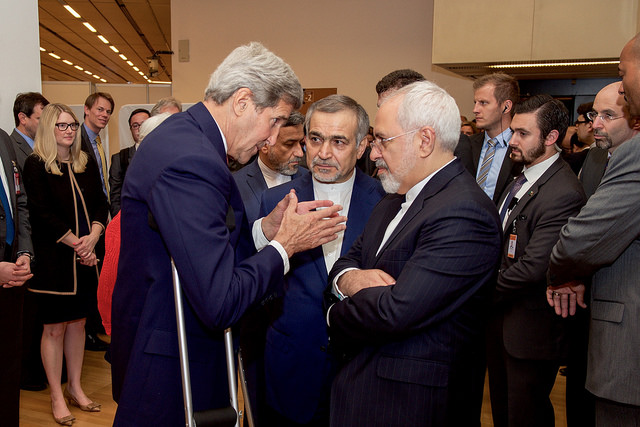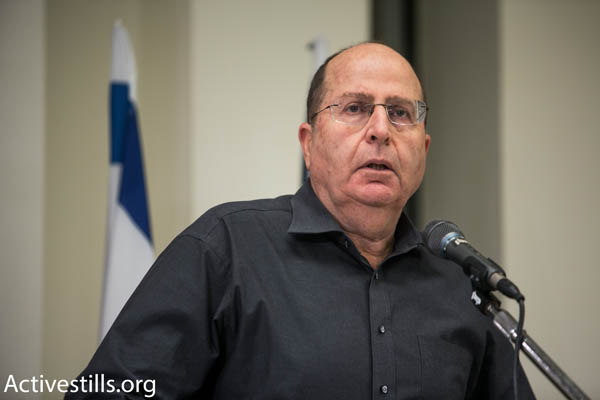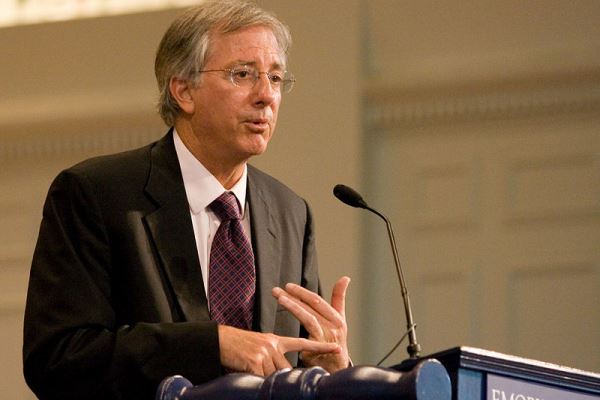Despite what Israel’s prime minister may have you believe, the Iran nuclear deal has succeeded in doing exactly what it set out to do: significantly decreasing the threat of a nuclear-armed Islamic Republic.
By Shemuel Meir

The annual Herzliya Conference made headlines a few weeks back simply due to the fact that former Defense Minister Moshe Ya’alon and former Prime Minister Ehud Barak pulled out a no holds barred attack on Benjamin Netanyahu. It was interesting to hear that Ya’lon told the crowd that “at this point in time and in the near future, Israel does not face any existential threats.” Ya’alon tied his remarks to the Iran nuclear deal, and in doing so fell in line with IDF assessments, which were laid out by IDF Chief of Staff Gadi Eizenkot in January 2016 during the INSS Conference. In the IDF’s view, the Joint Comprehensive Plan of Action (JCPOA) actually precipitated the decline of the Iranian threat.
Without a doubt this is a great way to begin discussing the one-year anniversary of the deal signed in Vienna on July 14, 2015. Ya’alon ditched the alarmism peddled by the prime minister and right-wing think tanks. His call to put an end to what he sees as baseless fear-mongering — including talks of a “second Holocaust” — are in line with things I have previously published on my Strategic Discourse blog.
Netanyahu responded to Ya’alon’s remarks by reminding us that not long ago, at the Munich Security Conference held in February 2016, the former defense minister claimed that despite the deal the Iranian nuclear threat is tangible and existential.
The exchange between the two took place in the run-up to the one-year anniversary of the deal. The milestone gives us an opportunity to take another look at the events. The deal blocked Iran’s path to a nuclear weapon both through preventing its military from enriching military grade uranium (93 percent) as well as producing plutonium. The agreement also subjected Iran to the most invasive and thorough inspections in the history of nuclear enrichment.
The final report published by the International Atomic Energy Agency (IAEA), which allowed the deal to come into force on January 16, 2016, established that Iran did not divert nuclear material to secret sites. The quarterly IAEA reports published since the deal was signed confirm that Iran has met all the conditions. This is good news that does not make headlines — unlike the critical IAEA reports that made the front pages of Israeli newspapers in years past. The attempt to claim that “this is the same Iran,” which does not cooperate with the international community on the nuclear issue, doesn’t hold water.
Not only did Ya’alon publicly declare the end of the Iranian threat, he also pulled the rug from under yet another alarmist claim by Netanyahu. According to the prime minister, not only did the Iran not stop the Islamic Republic’s nuclear ambitions, it paved the way for nuclear proliferation among neighboring countries. At the Munich Security Conference Ya’alon, then Israel’s minister of defense, declared that “the Arab countries are planning on obtaining nuclear weapons because they have no intention of standing idly by as Iran arms itself with nuclear weapons.” In his remarks at the Herzliya Conference, Ya’alon went against Netanyahu’s alarmism.
The pessimism of Netanyahu’s school of thought vis-a-vis Iran (if we put aside his fear-mongering and focus solely on analytical aspects) stems from nuclear determinism: no matter what happens in Iran or what the agreement says — the Islamic Republic is working toward obtaining a nuclear weapon. According to thos school of thought, Iran’s unchanging intentions are what matter, not a few “temporary” clauses in the deal, which in Netanyahu’s eyes only freeze Iran’s nuclear capabilities for 15 years. For Netanyahu intentions rather than abilities (which are under tight oversight) determine what happens. The point of departure of this worldview is axiomatic: there will always be a “parallel nuclear plan” that is unknown to the IAEA.
In Netanyahu’s world, in 2031 — when the limitations on the amount and type of centrifuges, as well as the amount of enriched uranium permitted (300 kilograms) disappear — Iran will, in a matter of weeks, have enough enriched uranium (93 percent) to create a nuclear bomb.
The alarmist analysis, however, ignores several important factors. IAEA’s invasive inspection, along with the Additional Protocol to which Iran is obligated, regularizes inspection at suspicious, non-declared sites for an indefinite period of time. IAEA’s intrusive inspection and monitoring system, which were nonexistent during the height of the Iranian nuclear crisis, will continue even after the end of restrictions on Iran under the JCPOA and as long as the Non-Proliferation Treaty (NPT) exists. Inspection is intended to ensure that Iran makes good on its obligations according to the NPT — that is, it is not diverting nuclear material for developing nuclear weapons. The IAEA’s rigid, continuous inspections coupled with American intelligence will make it possible to recognize early attempts at uranium enrichment above the permitted level for civilian purposes (up to five percent) and the possible violation of the treaty.
The Iran deal closed the opaque chapter in the Islamic Republic’s nuclear program. A nuclear weapon in Iran’s hands could have incentivized other Middle East countries to build their own bomb. Without an Iranian nuclear weapon, that incentive disappears. Thus the U.S.’s first objective in the long negotiations with Iran and world powers was met: preventing an Iranian nuclear weapon, as well as nuclear proliferation in the Middle East, and putting an end to a drift that could have brought about the disintegration of the NPT. The U.S.’s prioritization of preventing nuclear proliferation ensures that America will remain vigilant vis-a-vis obeying the deal and meeting all the required conditions that block Iran’s path toward nuclear armament.
Despite this, voices in Israel and elsewhere repeatedly speak about Saudi Arabia’s plans for building its own bomb. The lack of technological infrastructure and human assets in Saudi Arabia gave rise to the “off-the-shelf” Pakistani bomb theory: a nuclear bomb that will be given to Saudi Arabia “for the sake of balance” or a Pakistani nuclear weapon that will be based in Saudi Arabia (similar to NATO’s agreement in Europe) in exchange for the money Saudi Arabia gave to Pakistan’s nuclear program.
To mark a year since the deal, the Brookings Institute dedicated their report, titled “Prelude to Proliferation in the Middle East?” to examining the possibilities and dangers of nuclear proliferation in the Middle East after the Iran deal. According to the authors, Robert Einhorn and Richard Nephew (both of whom served as high-ranking officials overseeing arms control and nuclear proliferation nonproliferation in the Obama administration), the JCPOA will not lead to a “proliferation cascade.” The Iran nuclear deal dramatically lessened that danger.
A special chapter in the Brookings report was dedicated to Saudi Arabia and the “off-the-shelf Pakistani bomb” theory. In the wake of behind the scenes conversations with U.S. officials, Saudi Arabia, Pakistan and others, the researchers reached the conclusion that these are speculations that have been repeated so many times, to the point that they seem to have become a fact. The Saudi prince and former head of intelligence, Turki bin Faisal Al Saud, confirmed that Saudi Arabia never considered purchasing a nuclear weapon from Pakistan. According to Brookings researchers, it is possible that an oral “nuclear understanding” was made long ago between the Saudi king and Pakistan’s leaders — something along the lines of a vague, unwritten promise without operational details or the circumstances under which it would be activated. This is a past promise that is unlikely to become reality. Moreover, stationing a nuclear weapon in Saudi Arabia will bring about American and international sanctions, leading to the end of military coordination with the U.S., a central component of the kingdom’s security.
The Brookings researchers explain that the source of these rumors is a conversation between Dennis Ross and the Saudi king in 2009, which many quote. The king told Ross that “If Iran obtains a nuclear weapon — we too will obtain one.” But one can find an even earlier source for these rumors. During a Knesset Foreign Affairs and Security Committee briefing in October 2003, former head of Israeli Military Intelligence Ze’evi Farkash said that Iran would reach the “point of no return” in its development of a nuclear weapon within 10 months, and thus Saudi Arabia is also seeking to “immediately arm itself with nuclear weapons.” According to General Farkash, Saudi officials were in negotiations with Pakistan for stationing a nuclear weapon on their territory.
The former head of Israeli Military Intelligence Amos Yadlin is also tied to the obscure story of the Pakistani bomb. In November 2013, the BBC quoted Yadlin, who had previously told a conference in Sweden that if Iran obtains the bomb, “the Saudis will not wait one month. They already paid for the bomb, they will go to Pakistan and bring what they need to bring.” Yadlin refused to go on air, instead sending an email to the show’s producer: “Unlike other potential regional threats, the Saudi threat is very credible and immediate.” Let’s remember that the BBC broadcast happened in the beginning of November 2013, as Iran and world powers were at the height of negotiations — and at the end of that month the sides reached a temporary agreement that paved the way for the final deal in July 2015.
Back to the Herzliya Conference. In a rare public appearance, Egypt’s ambassador to Israel called for a two-state solution based on both the Arab Peace Initiative and the Paris Peace Summit. It is hard to believe Netanyahu is pleased with the praise for these two initiatives.
It seems Netanyahu’s enthusiasm decreased further when he was briefed on more point made during the ambassador’s speech. For the first time before an Israeli audience, Egypt called on Israel to join the NPT and efforts for establishing a nuclear-free Middle East. The Egyptian ambassador stressed his country’s role in nuclear disarmament in the region, stating that Egypt will continue to act on the diplomatic front on this issue. Following the signing of the Iran deal last year there has been a quiet diplomatic competition between Iran and Egypt over who will lead the efforts to establish a Middle East nuclear weapons free zone. The Egyptian ambassador chose to raise the issue before an Israeli audience. Following Iran nuclear deal, the traditional diplomatic dual between Israel and Egypt has turned into a nuclear triangle of Israel-Egypt-Iran.
Shemuel Meir is a former IDF analyst and associate researcher at the Jaffee Center for Strategic Studies at Tel Aviv University. Today he is an independent researcher on nuclear and strategic issues and author of the “Strategic Discourse” blog, which appears in Haaretz.



